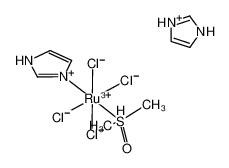

-
(imidazolium)[ruthenium(III)(tetrachloride)(S-dimethylsulfoxide)(imidazole)]
CAS No.201653-76-1
Formula:C8H16Cl4N4ORuS+
Home
> Encyclopedia
> Miscellaneous
> Chemical Reagents
> Aromatic Compounds
> (imidazolium)[ruthenium(III)(tetrachloride)(S-dimethylsulfoxide)(imidazole)]
Related Compound Information
- ganciclovir
- tenofovir (anhydrous)
- azamethiphos
- Adefovir
- 5-[5-(trifluoromethyl)-1,2-oxazol-3-yl]thiophene-2-sulfonyl chloride
- 2-[1-Methyl-5-(trifluoromethyl)pyrazol-3-yl]-thiophene-5-sulfonyl chloride
- 5-[2-methyl-5-(trifluoromethyl)pyrazol-3-yl]thiophene-2-sulfonyl chloride
- 5,7-bis(trifluoromethyl)pyrazolo[1,5-a]pyrimidine-3-carbonitrile
- 4-(9-ADENYL)-D-ERYTHRO-2,3-DIHYDROXYBUTYRIC ACID
- 2-[[(5Z)-5-(2-hydroxy-4-methyl-1,2,5-oxadiazol-3-ylidene)-1,2,4-triazol-3-yl]sulfanyl]acetohydrazide
